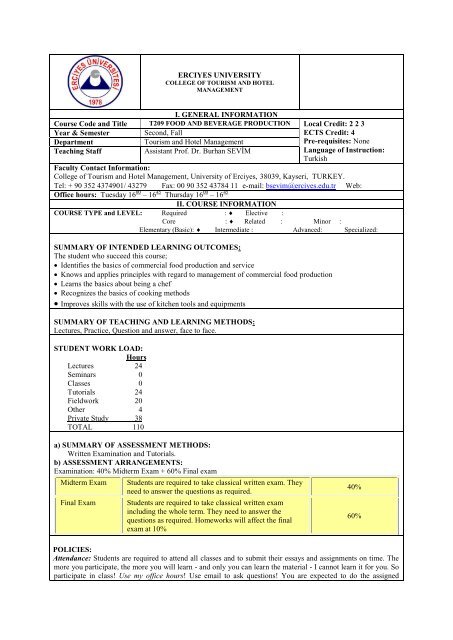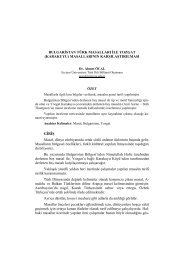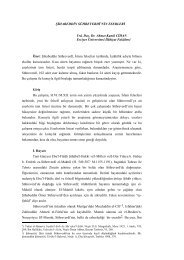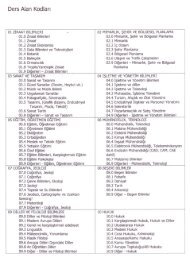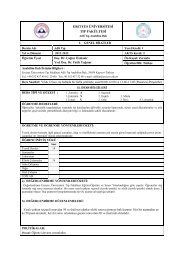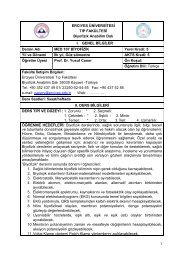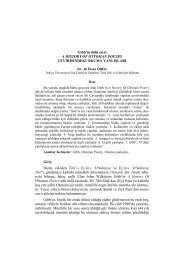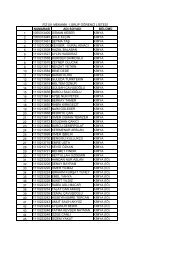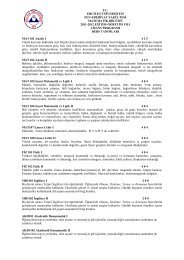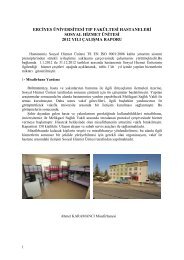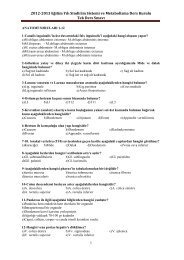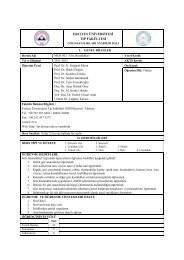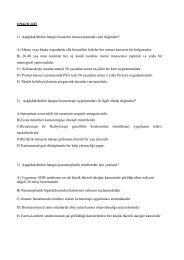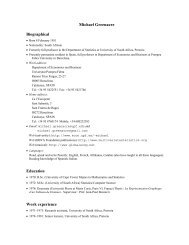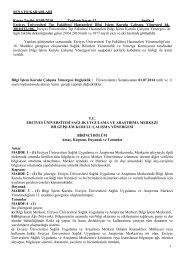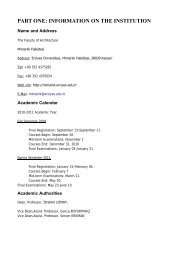Food and Beverage Production
Food and Beverage Production
Food and Beverage Production
Create successful ePaper yourself
Turn your PDF publications into a flip-book with our unique Google optimized e-Paper software.
ERCIYES UNIVERSITYCOLLEGE OF TOURISM AND HOTELMANAGEMENTI. GENERAL INFORMATIONCourse Code <strong>and</strong> Title T209 FOOD AND BEVERAGE PRODUCTION Local Credit: 2 2 3Year & Semester Second, FallDepartmentTourism <strong>and</strong> Hotel ManagementTeaching StaffAssistant Prof. Dr. Burhan SEVİMECTS Credit: 4Pre-requisites: NoneLanguage of Instruction:TurkishFaculty Contact Information:College of Tourism <strong>and</strong> Hotel Management, University of Erciyes, 38039, Kayseri, TURKEY.Tel: + 90 352 4374901/ 43279 Fax: 00 90 352 43784 11 e-mail: bsevim@erciyes.edu.tr Web:Office hours: Tuesday 16 00 – 16 45 Thursday 16 00 – 16 45II. COURSE INFORMATIONCOURSE TYPE <strong>and</strong> LEVEL: Required : Elective :Core : Related : Minor :Elementary (Basic): Intermediate : Advanced: Specialized:SUMMARY OF INTENDED LEARNING OUTCOMES:The student who succeed this course; Identifies the basics of commercial food production <strong>and</strong> service Knows <strong>and</strong> applies principles with regard to management of commercial food production Learns the basics about being a chef Recognizes the basics of cooking methods Improves skills with the use of kitchen tools <strong>and</strong> equipmentsSUMMARY OF TEACHING AND LEARNING METHODS:Lectures, Practice, Question <strong>and</strong> answer, face to face.STUDENT WORK LOAD:HoursLectures 24Seminars 0Classes 0Tutorials 24Fieldwork 20Other 4Private Study 38TOTAL 110a) SUMMARY OF ASSESSMENT METHODS:Written Examination <strong>and</strong> Tutorials.b) ASSESSMENT ARRANGEMENTS:Examination: 40% Midterm Exam + 60% Final examMidterm ExamFinal ExamStudents are required to take classical written exam. Theyneed to answer the questions as required.Students are required to take classical written examincluding the whole term. They need to answer thequestions as required. Homeworks will affect the finalexam at 10%40%60%POLICIES:Attendance: Students are required to attend all classes <strong>and</strong> to submit their essays <strong>and</strong> assignments on time. Themore you participate, the more you will learn - <strong>and</strong> only you can learn the material - I cannot learn it for you. Soparticipate in class! Use my office hours! Use email to ask questions! You are expected to do the assigned
eadings before coming to class. Readings are listed at the end of page. You should read these critically, askingquestions as you go - What does this mean (do I underst<strong>and</strong> it)? Why is it important to the study of researchmethodologies? When <strong>and</strong> how would I use this information? How does this information relate to otherinformation we've learned in class (or in other classes)? As you do the assigned readings, ask yourself thefollowing questions: What did I learn that I didn't know before? What did I already know, but gained a betterunderst<strong>and</strong>ing of? What am I still confused about?Lateness: Late attendances <strong>and</strong> submission will be not accepted. Students should not ask for exceptions.Academic Integrity: All students are expected to adhere to University policies concerning scholastic integrity.Any form of scholastic dishonesty will not be tolerated, Scholastic dishonesty includes, but is not limited to,cheating, plagiarism, falsifying academic records, <strong>and</strong> any act designed to give unfair academic advantage to thestudent.COURSE CONTENTS (PROGRAMME OF STUDY/SYLLABUS)WEEKS SUBJECT HOUR METHOD1 st WeekDefining <strong>and</strong> classifying food production 3+12 nd Week Properties of raw materials, food deficiency factors <strong>and</strong>quality characteristics of foods3 rd Week4 th Week5 th Week6 th Week7 th Week8 th Week2+2Storage, transportation <strong>and</strong> cleaning of raw materials 2+2Tools <strong>and</strong> equipments, Knife Skills 2+2Principles of cooking / Major objectives 2+2Flavors <strong>and</strong> Flavoring including Herbs <strong>and</strong> Spices 2+2Braising/stewing 2+2Vegetable cookery 2+2lecture,tutoriallecture,tutoriallecture,tutoriallecture,tutoriallecture,tutoriallecture,tutoriallecture,tutoriallecture,tutorial9 th Week EXAM 1 written10 th Week11 th Week12 th Week13 th WeekStockfond <strong>and</strong> soups, sauces 2+2Principles of meat cookery 2+2Fish <strong>and</strong> shellfish 2+2Salads <strong>and</strong> salad dressing 2+2lecture,tutoriallecture,tutoriallecture,tutoriallecture,tutorial14 th Week Workshop 3 Other15 th Week FINAL EXAM 1 writtenRECOMMENDED READING:The Culinary Institute of America (2006). Introduction to Culinary Arts. New Jersey:PearsonTürkan, C. (2003). Mutfak Teknolojisi. UBF Yayınları, Bolu.Maviş, F. (2008). Endüstriyel Yiyecek Üretimi. Detay Yayıncılık, Ankara.Gisslen, W. (2006). Professional Cooking. (6th ed.), John Wiley & Sons, Inc., New Jersey.The Culinary Institute of America (2008). In the H<strong>and</strong>s of a Chef: The Professional Chef'sGuide to Essential Kitchen Tools. John Wiley & Sons, Inc. New Jersey.


